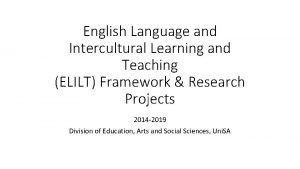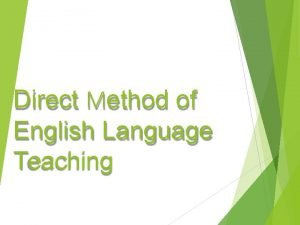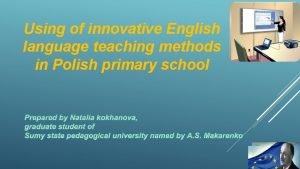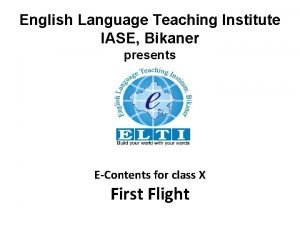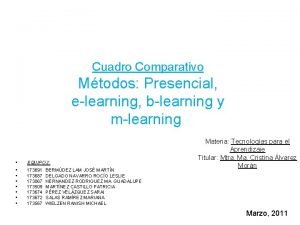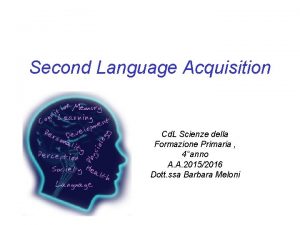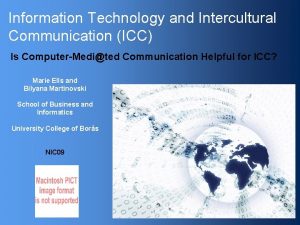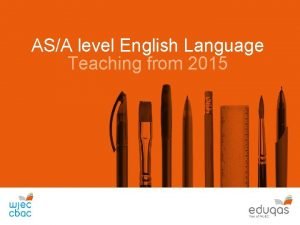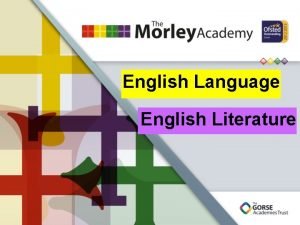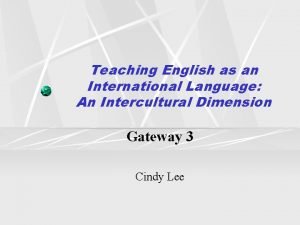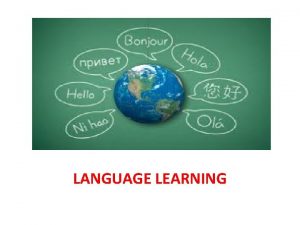English Language and Intercultural Learning and Teaching ELILT









- Slides: 9

English Language and Intercultural Learning and Teaching (ELILT) Framework & Research Projects 2014 -2019 Division of Education, Arts and Social Sciences, Uni. SA

ELILT Framework: Phases of Research & Consultation Phase 1 Phase 2 Pilot English Language Project 2014 Phase 3 Consultations & drafting the English Language & Intercultural Learning & Teaching Framework 2017 -2018 Follow-up study, focus group student interviews 2017: English language, Intercultural Learning, International Knowledge Exchange – data indicated need for further research (83 students, AAD, CIL, EDS, PSW) Phase 4 English Language, Intercultural Learning & International Knowledge Exchange Study 2018 -2019 Phase 5 Using Human Language Technology… (Digital Learning Strategy, T&L ) 2019 English Language & Intercultural Capabilities Learning Project: Two case studies: English Language & Intercultural Learning 2015 Research Two Reports, Div-EAS launch, November 2016

Study 3: English Language, intercultural learning & knowledge exchange – 2 stages of data collection Survey • 95 students • 4 schools of EASS: Education, AAD, PSW, CI • International & domestic • Undergraduate & postgraduate • Internal & external • 21 primary languages Interviews • 7 students • 3 schools of EASS: Education, AAD, PSW • International & domestic • Undergraduate & postgraduate • Internal • 5 primary languages

In brief Languages Academic English Developing and Multilingual students using academic use their languages English can be to support learning challenging for students Intercultural Learning Knowledge Exchange Students seek Students place high effective and value on (epistemic) meaningful knowledge exchange intercultural learning

What do students say? Languages Academic English 72% of multilingual students want academic materials in diverse languages 72% of students have experienced challenges with academic English. Materials to support: diverse perspectives understanding content understanding tasks & text types peer collaboration. Main challenges: academic writing terminology comprehending assignments speaking tasks. Intercultural Learning Students gave mixed and negative assessments of intercultural learning. Knowledge Exchange 93% of students believe international knowledge exchange benefits everyone. Students seek: Students perceived IL: • to learn from the limited to specific diverse experiences of courses staff and peers. course content and • purposeful, planned readings biased towards knowledge exchange: Anglo perspectives not in core content & assessments.

What needs does this imply? Think differently about language, culture & knowledge - in learning & teaching use of language in learning & teaching academic English is just one form of language amongst many international (epistemic) knowledge beyond the Western canon culture beyond notions of ethnicity, nationality, cuisine & customs all students & staff bring different resources knowledge exchange is multidirectional linguistic, cultural & faith-based diversity does not guarantee knowledge exchange Develop approaches for using diverse linguistic, cultural & knowledge resources in teaching for effective learning explicitly teach language demands in courses provide language support & resources acknowledge students’ language, culture & knowledge diversities incorporate purposeful & effective knowledge exchange encourage student & staff reflexivity

Responding across different domains

What should we do? See also ELILT framework, Section 4 & Appendix A Languages Academic English Incorporate academic materials in a range of languages into course content and reading lists Promote opportunities for language learning Develop a diverse campus linguistic landscape (signage, print, art, design & soundscapes) Include bi-/multilingual inward and outward facing Uni. SA websites Audit academic English language demands of courses and assessments Explicitly teach academic language within courses Provide helpful feedback to students on English Promote EAL courses, learning support and online resources Provide staff training in multilingual and English language teaching approaches Intercultural Learning Knowledge Exchange Incorporate intercultural content into core curriculum and assessment Develop staff training in intercultural learning Support exchanges and intercultural experiences for students and staff Promote intercultural campus ecology and events Address class size and composition to support knowledge exchange Develop staff training on grouping & facilitating exchange interactions Purposeful use of tutorial tasks & assessment to facilitate interaction & knowledge exchange Promote peer study groups & online forums Promote services to support student participation

Acknowledgements We wish to acknowledge our appreciation for the support within the Div-EAS between 2014 and 2019 to: Professor Joanne Cys Associate Professor Graham Hardy Professor Ruth Bridgstock Associate Professor Veronika Kelly The ELILT Reference and Working Groups 2015 -2018 The Research Teams 2014 -2016 Dr Kerrilee Lockyer 2017 -2018 Dr Fiona O’Neill and Dr Mei French 2018 Ms Cathy King Kathleen Heugh, Shashi Nallaya, Ruth Fazakerley 16 April 2019
 Elilt
Elilt Direct method principles
Direct method principles Subjek evaluasi internal
Subjek evaluasi internal Innovative teaching methods in english
Innovative teaching methods in english English language teaching institute
English language teaching institute Cuadro comparativo entre e-learning b-learning y m-learning
Cuadro comparativo entre e-learning b-learning y m-learning Microteaching meaning
Microteaching meaning Language acquisition and language learning
Language acquisition and language learning Technology and intercultural communication
Technology and intercultural communication A level english language language change
A level english language language change
